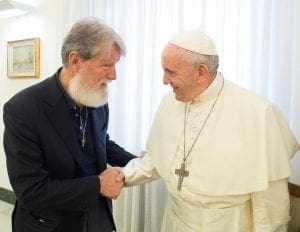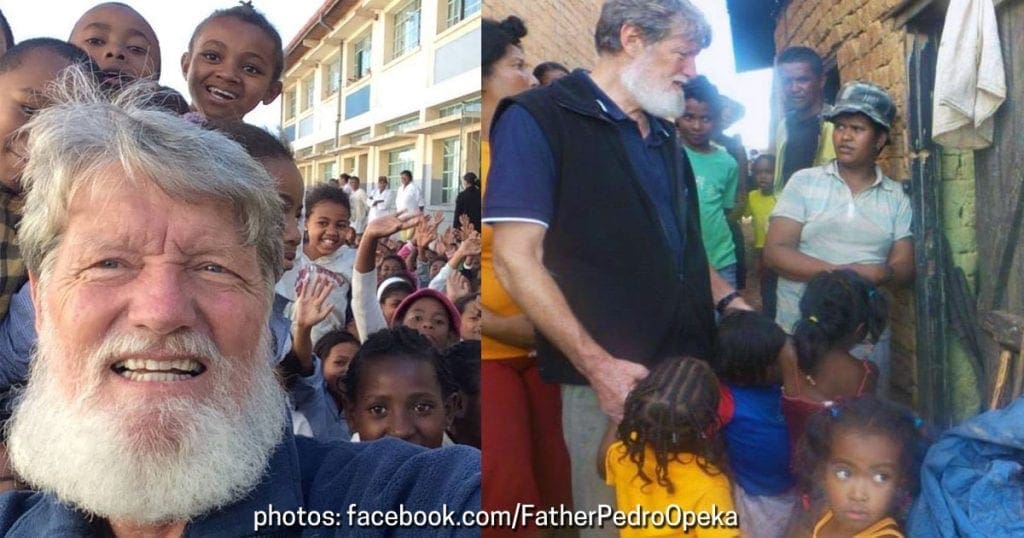The Question That Built a City!
[On September 8th Pope Francis himself is going to spend the day visiting this city built by a “community of friends” as a result of the question asked by Vincentian Father Pedro Opeka.]
When he arrived he was struck by the sight of the garbage dump sites from the hills of the city, and headed over only to find thousands of people, adults and the young, scavenging for food like wild animals. He found children sleeping on the site with cardboard boxes as mattresses and flies as their blankets. He found people who died amidst the garbage, with no one there to give them a proper burial.
Heart-breaking! Where would you start? Where did he start?
 Fr. Pedro Opeka, CM asked them a question: “Do you love your children?” When he received an affirmative response, he said: “Let’s work together, give them a future.”
Fr. Pedro Opeka, CM asked them a question: “Do you love your children?” When he received an affirmative response, he said: “Let’s work together, give them a future.”
Akamasoa was born that day. Fewer than 30 years later, they’ve virtually built an entire city, divided into 18 neighborhoods that give dignified brick homes to some 23,000 people, connected by paved roads. There are 3,000 masons on the project, and work is never lacking.
The Backdrop of the Man and Question
“God’s Mason,” “Mother Teresa with pants,” “God’s soldier,” “the apostle of garbage” and “the insurgent of Madagascar” are but a handful of the nicknames given to Father Pedro Opeka. Nominated multiple times for the Nobel Peace Prize, he is also a recipient of France’s Legion of Honor and several papal awards.
Born in Argentina in 1948 to Slovenian parents who fled Europe after World War II, Opeka is a missionary priest who’s been serving in Madagascar, the world’s ninth poorest country, for almost 50 years.
 He was in Rome recently because three countries – Argentina, Slovenia, and Monaco – were throwing a dinner to raise funds for his foundation. He was twice received by Pope Francis.
He was in Rome recently because three countries – Argentina, Slovenia, and Monaco – were throwing a dinner to raise funds for his foundation. He was twice received by Pope Francis.
But on that night, after seeing the open-air dumpster, he kneeled in his bed, and with his arms towards heaven, said: “Lord, help me help these children.”
The following day he went back and was questioned by the locals, who asked: “Hey, white man, what do you want?” The bias of being a “white” person in a country that still remembers its independence from white colonizers was one of the many waves he had to surf.
But he was, quite literally, a man on a mission.
He told those confronting him that he was a missionary priest and that he wanted to speak with them, but not “out here, invite me into your home.” By home, he meant a cardboard structure that was some three feet tall. He had to crawl on hands and knees to go in, and when they sat on the floor- a carpet of garbage- the roof was some 10 inches above his head.
That is when he asked the question that started it all.

Lessons of Akamasoa for Systemic Change
The name Akamasoa itself contains many lessons. “Akamasoa,” means “good friends” in Malagasy.
Think about it.
Friends – people you know, love and respect. He showed his love and respect for the people.
Good – not merely fair weather, people who will work together.
Systemic change is not complicated! It is all about good friends listening to each other.
As a Vincentian missionary in Madagascar he says it simply, “living in Akamasoa is, first of all, action, not words. Those of us, who never hide the truth, seek to be clear when we face problems. We do not ignore them. We face them. That is sincerity.”
Pause to reflect
* How do I manifest genuine friendship to those I serve?
* Do I take the time to listen to their hopes?
* Am I willing to do whatever it takes to help them fulfill their hopes?
Sources:







0 Comments